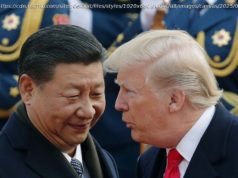Beijing is showing signs of compromise in trade talks with US in Washington.
China is sending conciliatory signals as U. S. and Chinese negotiators meet in Washington to try to head off a trade war between the world’s two biggest economies.
Beijing has dropped an anti-dumping investigation into imported U. S. sorghum, which it had accused the United States of unfairly subsiding. It has also given approval for a U. S. private equity firm to buy Toshiba’s memory chip business.
Those gestures could suggest a thaw with the U. S. as trade talks went on for a second day Friday in Washington.
«China has come to trade,» Larry Kudlow, the top White House economic adviser, told reporters. «They are meeting many of our demands. No deal yet, to be sure, and it’s probably going to take a while — it’s a process.»
China’s Commerce Ministry said Friday that it was ending its inquiry into whether the U. S. was dumping sorghum in the Chinese market at artificially low prices, saying the investigation was not in the public interest. A day earlier, Beijing had cleared the way for a group led by the U. S. private equity firm Bain Capital to buy Toshiba’s computer memory chip business.
The moves signaled at least a willingness by Beijing to work toward a deal with Washington.
«I think China is willing to make concessions,» said Wang Tao, chief China economist at UBS. «The Chinese stance has been very clear — that China wants to mute any trade dispute. But of course it doesn’t mean China would heed to all the demands the U. S. would place.»
President Donald Trump said Friday that America’s lopsided trade relationship with Beijing — the U. S. trade deficit with China last year reached $337 billion, its largest with any other nation — is «bad for our country. And we’re changing it around.»
A White House official said China had offered to work to cut its trade deficit with the U. S. by $200 billion, while stressing that any details remained unclear. But China’s Foreign Ministry denied that any such offer had been made.
«It’s untrue,» said spokesman Lu Kang. «The relevant discussion is still underway, and it is constructive.»
The Commerce Ministry said it was ending the anti-dumping probe and a parallel anti-subsidy investigation because they would have raised costs for Chinese consumers.
The U. S. is China’s biggest supplier of sorghum, accounting for more than 90 percent of its total imports. China’s investigation, launched in February, had come as a warning shot to American farmers, many of whom support the Trump administration yet depend heavily on trade. They feared they would lose their largest export market for the crop, which is used primarily for animal feed and liquor.
«Anti-dumping and countervailing measures against imported sorghum originating in the United States would affect the cost of living of a majority of consumers and would not be in the public interest,» according to a notice posted on China’s Commerce Ministry website.
The ministry said it had received many reports that the investigation would result in higher costs for the livestock industry, adding that many domestic pig farmers were facing hardship because of declining pork prices.
China’s U. S. sorghum imports surged from 317,000 metric tons in 2013 to 4.76 million tons last year. Prices fell by about a third over the same period.
The ministry said any deposits for the preliminary anti-dumping tariffs of 178.6 percent, which took effect on April 18, would be returned in full.
The announcement came after Trump met at the White House with Vice Premier Liu He, the leader of China’s delegation for talks with a U. S. team led by Treasury Secretary Steven Mnuchin.
Trump had told reporters Thursday that he had doubts about the potential for an agreement. He also raised fresh uncertainty about resolving a case involving ZTE, the Chinese tech giant that had been hit with a crippling seven-year ban on buying from U. S. suppliers, forcing it to halt major operations. Trump said ZTE «did very bad things» to the U. S. economy and would be a «small component of the overall deal.»
Song Lifang, an economics professor and trade expert at Renmin University, said it’s clear that haggling is underway.
«It’s time for both to present their demands, but it’s also a time to exhibit their bargaining chips,» said Song.
Song added that approval for the Toshiba deal, worth $18 billion, was «an apparent sign of thaw.»
The trade dispute between the United States and China put financial markets on edge and alarmed businesses in recent weeks.
Last month, the Trump administration proposed tariffs on $50 billion of Chinese imports to protest Beijing policies that require foreign companies to hand over their technology in exchange for access to China’s market. The president later ordered his trade team to seek up to an additional $100 billion in Chinese products to tax.
The sanctions are part of a broader conflict over China’s aggressive push to challenge U. S. technological dominance.
China responded by targeting $50 billion in U. S. products, including soybeans — a shot at Trump supporters in America’s heartland.
Trump said his team was working on trade deals that are «going to be great for our country. Our country has been ripped off long enough. And we are making great deals.»
On Thursday, though, his top trade negotiator, Robert Lighthizer, said that after nine months of talks, the U. S., Canada and Mexico still were «nowhere close to a deal» to rewrite the North American Free Trade Agreement, a 24-year-old pact that Trump has called a job-killing disaster.
Lighthizer mentioned «gaping differences» on issues ranging from farm trade to labor standards to intellectual property protections.






